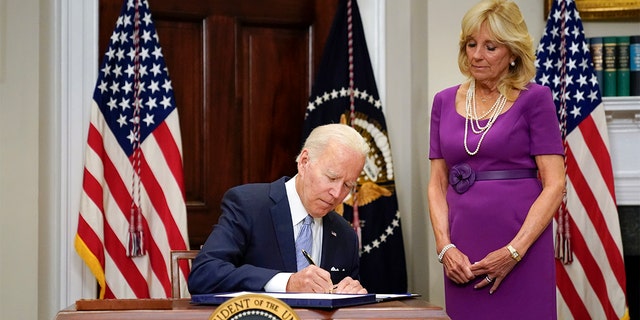
NEWYou can now listen to Fox News articles!
Democrats may rue the day they titled the Inflation Reduction Act the Inflation Reduction Act.
The massive spending package addresses a host of issues. Health care. Environmental policy. Taxation. Spending. Democrats elected to advance the package under special budget reconciliation rules. That means the bill must be budget neutral. Democrats contend the bill will bring down the deficit by more than $300 billion over a ten-year period.
Democrats also claim the bill will reduce inflation. Republicans are adamant it won’t.
One thing is certain: Democrats are likely on the hook for inflation and the state of the economy at the polls this fall. And even if the bill does help corral inflation, it’s doubtful that impact will resonate with voters by then.

The chamber of the House of Representatives (AP Photo/J. Scott Applewhite)
That means Republicans can continue to torch the measure as misnamed. And Democrats, hoping that the bill may salvage some races in the midterm chances, are left with the inflationary stamp.
It is doubtful Americans will see economic impact that quickly. And the psychology of the electorate is mostly established by this point in the cycle ahead of the midterms.
Congressional Democrats believe they have a lot of legislative achievements to tout this November. They passed the $1.9 trillion COVID bill in March of last year. They approved the bipartisan infrastructure package. They muscled through the first major piece of legislation to address firearms violence in nearly three decades.
FOX NEWS POLL: RACE FOR CONGRESS TIGHTENS
They approved a bipartisan bill to bolster the computer chip and semiconductor industry in the U.S. They OK’d the bipartisan plan to help veterans who were exposed to “burn pits.” And now Democrats intend to trumpet their social spending package, billed as the “Inflation Reduction Act,” or “IRA.”
Democrats tried for 14 months to approve some version of “Build Back Better,” their social spending package. They didn’t get that. But Democrats view the Inflation Reduction Act as the crowning achievement of their legislative program for the 117th Congress.
And it was a crush to complete this in August. The Senate was supposed to start its August recess last week, but senators stuck around for marathon, round-the-clock sessions over the weekend to pass the IRA Sunday afternoon. It was important for Democrats to approve the bill in August — in hopes that passage of the bill would sink in with voters.

Democratic presidential candidate Joe Biden speaks about his Build Back Better economic recovery plan for working families July 21, 2020, in New Castle, Del. (Brendan Smialowski/AFP via Getty Images)
The House then returned from recess to align with the Senate and pass the bill.
An important August feat for Democrats.
But this sounds very familiar to circumstances facing a Democratic president and a Democratic Congress approaching the midterm elections of 1994.
HOUSE SET FOR VOTE ON DEMOCRATS’ SOCIAL SPEDING, TAX AND CLIMATE BILL: LIVE UPDATES
Former President Bill Clinton oversaw the 105th Congress pass the Family and Medical Leave Act in early 1993. Then came a major budget reconciliation act to fuel the economy in August 1993. Sound familiar? Congress OK’d the “Brady Handgun Violence Prevention Act” to impose a waiting period and background checks for firearms purchases in November 1993.
Passage of the North American Free Trade Agreement (NAFTA) also came in the autumn of 1993. After an initial hiccup, the House and Senate finally approved a crime bill, which included the assault weapons ban, in August 1994.
After some political stumbling, the House had to return to session in late August to sync up with the Senate on the crime bill. Crime surged in the U.S. at the time. Democrats considered the crime bill to be the touchstone of their legislative program for 1994.

President Bill Clinton reacts to being impeached by the House of Representatives (David Hume Kennerly/Getty Images)
I had just gotten to Washington and began my first job at C-SPAN in the fall of 1993. I recall a conversation with a colleague about then-President Clinton’s legislative achievements in such a short time.
“People don’t want to admit it, but he’s on a roll right now,” my colleague said of Mr. Clinton.
DEMOCRAT PROMISES MORE TAXES IF THE PARTY STAYS IN POWER: REPORT
Democrats may have approved nearly everything they hoped to achieve that Congress. But that made little difference in the fall midterms that year.
Republicans then shellacked Democrats in the 1994 midterms. Republicans flipped the Senate. And House GOPers won control of the House for the first time in 40 years. The GOP captured an astonishing 54 House seats that fall.

Newt Gingrich speaks about Trump, Trudeau and Nieto regarding NAFTA Negotiations at the Dentons NAFTA 2.0 Summit Oct. 11, 2017, in Washington, D.C. (Paul Morigi/Getty Images for Dentons)
What is past is prologue.
So, review President Biden’s legislative achievements for the 117th Congress. Whether you like his policy goals or not, to paraphrase my former colleague, Mr. Biden may well be “on a roll” when it comes to his priorities.
Much has been made about the Democrats’ chances to keep the House this fall. Analysts predicted that Republican chances could look a lot like 1994. Some forecast that Republicans could win as many 50 to 60 seats a few months back.
MANCHIN-SCHUMER BILL ON GLIDE PATH IN HOUSE; OBSTACLES REMAIN GIVEN DEMOCRATS’ DISUNITY
That figure appears high now. Most analysts have tempered those expectations significantly in recent weeks. Top House race observers have even moved a few seats in the direction of Democrats of late.
The Senate is a jump ball for either party.
So, Democrats are slightly closing the gap. But don’t expect the Inflation Reduction Act to necessarily boost their chances to hold the House. In fact, the most significant event that may help Democrats is the decision by the Supreme Court in the abortion case. That ruling from the Supreme Court certainly energized Democratic, pro-choice voters — far more than anything done across the street at the Capitol.

President Biden signs into law S. 2938, the Bipartisan Safer Communities Act gun safety bill, in the Roosevelt Room of the White House in Washington June 25, 2022. (AP Photo/Pablo Martinez Monsivais)
So compare what we know so far about 2022 with 1994. Passing big chunks of your legislative agenda may have little impact on how voters cast their ballots. Much of this is about the psychology of the voters. And the die may already be cast going into the fall for the Democrats.
Sure, progressives would have preferred to spend $4 trillion on Build Back Better rather than just several hundred billion. But they’ll score the biggest investment in climate initiatives ever in the IRA. Liberals may have wanted something more robust on family leave and free education. They certainly aimed for something more dramatic on guns and even tax policy.
But, for most Democrats, they achieved many of their legislative desires.
CLICK HERE TO GET THE FOX NEWS APP
And, despite the criticisms of President Biden, he and his party are on a legislative “roll.”
But, regardless of their agenda, it may not be enough to prevent Democrats from getting rolled at the ballot box in November.







